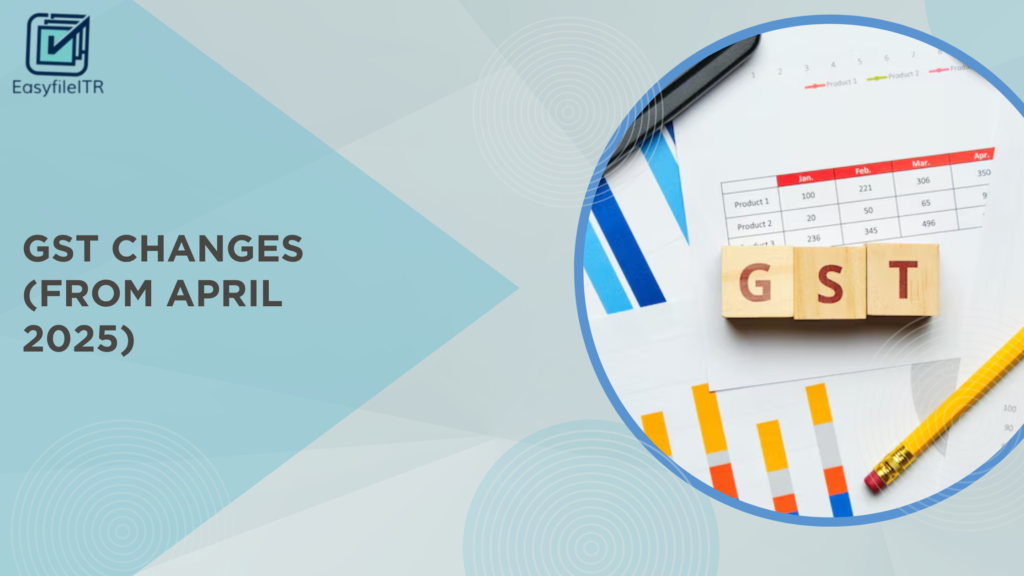
The Indian government initiated an extensive overhaul of the Goods and Services Tax (GST) framework during the beginning of the new financial year. The new changes target three primary objectives including compliance simplification alongside improved tax governance and enhanced digital security alongside better business operations in India. The process of adapting to new rules will simplify business operations which will prevent potential penalties for both taxpayers and businesses.
The following article analyzes all key GST changes for FY 2025–26 alongside their business implications.
1. Mandatory Input Service Distributor (ISD) Registration
All businesses that possess more than one Goods and Services Tax registration under the same Permanent Account Number must become Input Service Distributors beginning April 1, 2025. The GST changes authorities discontinued the previous option to use either ISD mechanisms or cross-charge models for distributing common input tax credits.
Impact on Businesses:
- As of April 1, 2025 it has become compulsory for all businesses to register as Input Service Distributors to share the costs of rent, legal fees and IT expenses throughout their branches.
- To comply businesses need to issue documents using the ISD invoicing system while submitting their GSTR-6 documents monthly.
- Improved transparency, traceability, and standardisation in ITC distribution.
2. Revised GSTR-7 & GSTR-8 Formats – Effective Feb 11, 2025
The Government of India implemented Notification No. 09/2025–Central Tax to revise GSTR-7 and GSTR-8 formats that enhance data reconciliation processes as well as provide stronger audit trail capabilities.
GSTR-7 (For TDS Deductors):
- The system requires TDS specifics to be recorded at both invoice level and document level.
- The necessary data points to submit consist of deductee GSTIN together with invoice date, value and deducted tax amount.

GSTR-8 (For E-commerce Operators):
- More granular reporting of transaction-level data.
- Aims for accurate TCS computation and easier reconciliation for sellers.
Action Required:
- The update of GST software requires modifications to implement new fields into the system.
- The revised document formats should receive training to back-end personnel.
3. e-Way Bill and e-Invoice Timeline Reforms
A. e-Way Bill Restrictions
Starting January 1, 2025:
- e-Way Bills enable issuance for internal documents dated within 180 days from the present date.
- The extended period cannot exceed 360 days beyond when the original generation occurred.
These specifications intend to fight tax evasion while getting rid of backing up documents in time and use cases involving goods transportation.
B. 30-Day e-Invoice Reporting Rule Extended
Effective April 1, 2025:
- Any business with an Annual Aggregate Turnover above ₹10 crore must submit B2B invoices through Invoice Registration Portal (IRP) starting from the date of invoice generation until thirty days after its issuance.
- Businesses that report late to the Invoice Registration Portal will get their IRN rejected thus forfeiting their opportunity to claim ITC benefits.
4. Mandatory Multi-Factor Authentication (MFA)
The government requires Multi-Factor Authentication (MFA) as a compulsory security measure for GST portal users starting from the 2025–26 fiscal year.
How It Works:
- Requires two-factor authentication (2FA).
- Options include:
- Password + OTP via SMS
- OTP via Sandes App or NIC-GST-Shield App
- TOTP via GSTN’s mobile app
Benefits:
- Enhanced data security
- Reduced risk of unauthorised filings
- Trusted digital experience for taxpayers
5. Sequential Filing of GSTR-7 Made Mandatory
All TDS deductors under the GST framework have to file their GSTR-7 returns sequentially beginning on November 1, 2024. The platform will prevent new submissions when one or multiple previous filings including no-return submissions are not submitted.
Why It Matters:
- Ensures smooth TDS reconciliation
- Prevents return mismatches
- Encourages timely filing
Rationalised Late Fees:
The modifications to late fee structures aim to reduce costs for timely filers without compromising disciplinary measures.
6. Biometric Authentication for Company Directors
From March 4th, 2025 forward biometric authentication will become mandatory for all directors and promoters of Indian or foreign companies at GST Suvidha Kendra facilities located in their native state.
Process Includes:
- Fingerprint & facial scan
- Photograph capture
- On-site document verification
The new identity verification framework streamlines user sign-ups and decreases fraudulent use of GSTINs.
✅ All new GST registration which involve corporate entities need to follow this rule.
7. GST Rate Reforms: Hotels and Used Cars
A. Hotels will now have their actual transaction values taxed under the GST system.
- The earlier “Declared Tariff” system completely disappeared from use.
- The price the customer ultimately pays serves as the basis for existing GST taxation.
- The rate of GST for hotel accommodation that exceeds ₹7,500 per night is 18%.
- Full ITC eligibility for hotel and associated restaurant services.
B. Used Cars: Flat 18% on Margin Value
- The vehicle category restriction does not apply to electric or sport utility vehicles and all additional categories.
- GST payable only on margin = Sale Price – Purchase Price.
- GST taxation never occurs when the margin amount results in a negative balance during sale transactions.
The new changes improve tax equity while diminishing sectoral disputes andStraightening up tax paperwork for hotels and automotive companies.
8. New Invoice Series Requirement from April 1, 2025
Every financial year, GST-registered businesses need to create fresh invoice series.
Key Guidelines:
- Each invoice series needs to have individual characteristics combined with non subsidiarity and continuous ordering.
- Businesses need distinct invoice series to bill invoices alongside other documents including invoices and debit notes.
- Multiple vertical businesses need to establish separate series which are easily distinguishable to each other.
9. GST Waiver Scheme 2024 (Amnesty Scheme)
GST introduced a one-time amnesty scheme to address disputes that had accumulated during its first years of operation.
Eligibility:
- The scheme applies to tax liabilities spanning from FY 2017–18 through 2019–20.
- Businesses can benefit from this provision when they complete the principal tax payment no later than March 31, 2025.
Benefits:
- Full waiver of interest and penalties.
- Businesses must file applications through Form SPL-01 or SPL-02 by the deadline of June 30, 2025.
The opportunity represents a great way for companies to pay unresolved debts and open a clean start for FY 2025–26.
Final Takeaways: What You Should Do Next
✅Every business with several GSTINs assigned to a single PAN must secure an ISD registration.
✅Update your ERP system and accounting platform to receive latest support functionally.
Revised GSTR-7 and GSTR-8 formats
e-Invoice reporting within 30 days
New e-Way Bill limits
Year-specific invoice series
✅ Enable Multi-Factor Authentication for all portal users.
✅ The successive procedure should be maintained when submitting GSTR-7 notices even if these returns show no value.
✅ Businesses applying for new GST registration must prioritize the scheduling of director biometric authentication procedures.
✅ Your business can benefit from the GST Waiver Scheme by paying outstanding debts before March 31, 2025.
Let Easyfileitr Simplify Your GST Compliance
Easyfileitr supports your business in understanding compulsory ISD registration and deploying MFA thus helping you maintain compliance while staying updated for audits. With expertise from our team of GST experts your business can get professional guidance on new changes along with system update and compliant return filing services so you can focus on growth.
📞 Need help with GST filing or system upgrades? Contact IndiaFilings now
Is Input Service Distributor (ISD) registration now mandatory for all multi-GSTIN businesses?
Yes. From April 1, 2025, all businesses having multiple GST registrations under the same PAN must register as ISDs to distribute common input tax credits (ITC). Cross-charge is no longer allowed.
What happens if businesses fail to report B2B invoices to the Invoice Registration Portal (IRP) within 30 days?
If the IRN is not generated within 30 days, the system will reject the invoice, making the recipient ineligible for Input Tax Credit (ITC). This is applicable to businesses with AATO above ₹10 crore.
What is the new rule for e-Way Bill validity from January 2025?
e-Way Bills can only be generated for documents dated within 180 days from the current date and not older than 360 days from the original generation. This curbs misuse and backdating.
Who needs to undergo biometric authentication from March 4, 2025?
All directors and promoters of Indian or foreign companies applying for new GST registration must undergo biometric verification at GST Suvidha Kendras in their native state.
What happens if GSTR-7 returns are not filed sequentially?
The system will block future GSTR-7 filings if prior months are not filed (including NIL returns). This ensures compliance and prevents mismatch in TDS credit.

